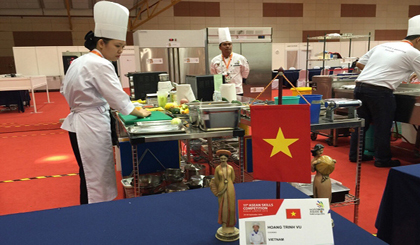Vietnam's labour productivity still lower than regional countries
Vietnam's labour productivity remains very low compared to other countries in the region including Singapore, Thailand, Malaysia, Indonesia and Laos.
 |
| A Vietnamese contestant at the 11th ASEAN Skills Competition |
New statistics released by the General Statistics Office (GSO) showed that Vietnam's labour productivity levels are still very low and the productivity gap between Vietnam and regional countries continue to widen.
At the press conference on the national socio-economic situation in 2017 held on December 28, GSO General Director Nguyen Bich Lam said that the productivity of the whole economy at current prices in 2017 is estimated at VND93.2 million per worker (equivalent to US$4,159 per worker).
Based on the prices in 2010, the productivity of the whole economy in 2017 has increased by 6% compared to 2016 and the average productivity in the 2011 - 2017 period rose by 4.7%.
According to Lam, Vietnam's labour productivity has improved significantly over the past years and has seen a high productivity growth rate among the ASEAN region, but Vietnam's labour productivity remains low compared to many other countries in the region.
Notably, the productivity gap between Vietnam and other countries continues to increase. Calculations based on the purchasing power parity in 2011, Vietnam's labour productivity in 2016 reached US$9,894, equivalent to 7% of the labour productivity of Singapore; 17.6% of Malaysia; 36.5% of Thailand; 42.3% of Indonesia; 56.7% of the Philippines and 87.4% of Laos.
Lam said that the fourth scientific and technological revolution has created the trend of automation and exchange of data in production which may put Vietnam at risk of being left behind by the developed countries. Economists said that if Vietnam did not make much progress, it would never catch up with developed countries, which is one of the biggest challenges for Vietnam.
GSO stated that management agencies, ministries and local authorities should continue to reform institutions and business environment with the top priorities given to improving labour productivity and grasping the 4.0 revolution to integrate into the world.
(Source: NDO)
 về đầu trang
về đầu trang






